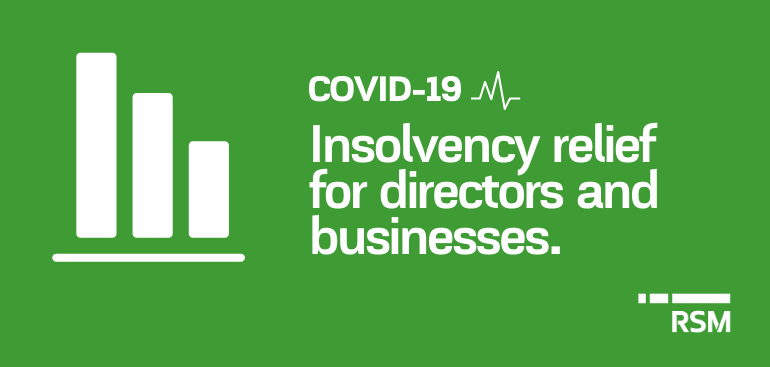
The Government has announced measures to assist directors and businesses that have been affected by COVID-19. The changes flow from concerns that numerous companies could be placed into liquidation due to the uncertainty caused by the pandemic.
Although the details will not be known until the Bill is introduced, the proposals cover;
- Director liability for insolvent trading
- A business debt hibernation scheme
- Changes to legislative deadlines and constitution/rules requirements
Directors’ liability relief
A key concern for company directors is how COVID-19 affects their duties under the Companies Act 1993. Although shareholders are not liable for a company’s debts, situations exist where directors can be personally responsible for those. The situations most likely to cause this are;
- Trading recklessly - directors must not cause or allow a business to be carried on in a manner likely to create a substantial risk of serious loss to its creditors.
- Taking on inappropriate debts - directors must not agree to a company incurring a debt unless they reasonably believe that the company will be able to repay that debt when required.
The economic uncertainty caused by COVID-19 means that directors may lack confidence to continue trading, in case they become personally liable for the debts of the companies they lead. This could result in unnecessary liquidations of business that are otherwise sound, except for circumstances caused by COVID-19. To combat this, the safe harbour proposals mean that continuing to trade and taking on new debts over the next six months will not breach the above duties if;
- In the good faith opinion of the directors, the company is facing or is likely to face significant liquidity problems in the next six months as a result of COVID-19 on them or their creditors;
- The company was able to pay its debts as they fell due on 31 December 2019; and
- The directors consider in good faith that it is more likely than not that the company will be able to pay its debts as they fall due within 18 months.
Subject to Parliament’s approval, these changes will be backdated to 3 April 2020.
Directors will still be expected to exercise reasonable care, diligence and skill and act in good faith and in the best interests of the company. However, this should provide some confidence for directors to lead their companies forward at a time when the country needs them to do this.
Debt hibernation scheme
In addition to the safe harbour relief for directors, a temporary regime will be introduced for companies needing to put debts into “hibernation” until they are able to be paid. The intention of the new regime is that directors reach agreement with creditors which allow the business to continue trading. Unlike a Liquidation or Voluntary Arrangement, the directors would retain control of the company rather than passing control to an insolvency practitioner. The regime is expected to include the following features:
- There will be a threshold to access the regime. For example, the organisation will need to have been solvent prior to COVID-19.
- A proposal will need to be put to creditors who will have a month to vote on it. Agreement would require fifty per cent by number and value.
- There will be a one month “hibernation” on the enforcement of debts from the date the proposal is put to creditors, and a further six months if the proposal is passed.
- This would be binding on all creditors other than the entity’s employees, and subject to any conditions agreed with creditors.
- If the creditors reject the proposal, the existing insolvency options under the Companies Act are available, such as voluntary administration and/or liquidation.
It is proposed that any subsequent payments made by the company to third party creditors would be exempt from the voidable transactions regime, subject to the following conditions;
-
The payments (or dispositions of property) are not to a related party.
- The transaction must be entered into in good faith by both parties, on arm’s length terms and without the intent to deprive the existing creditors of the company.
This means anyone continuing to trade with the company will not have to worry about a liquidator seeking to unwind transactions if the company is later placed into liquidation. The regime is expected to be available to all forms of entities (including incorporated societies and partnerships) but not for licensed insurers, registered banks, non-bank deposit takers, and sole traders (which have other options).
Other support measures
In addition to the above, other measures will include;
- Voidable transactions - the time period for looking back and making payments “voidable” by a liquidator will be reduced from two years to six months where the company and the creditor are not related.
- Extending statutory deadlines - some deadlines, such as holding AGMs and filing annual returns will be relaxed.
- Non-compliance with entity constitutions - there will also be temporary relief for entities that are unable to comply with their constitutions or rules because of COVID-19.
The government will be providing more details on the above package in the next few weeks and we will keep you informed of these.
In the meantime, please contact your usual RSM advisor if you have any queries or need assistance in regard to the above.
